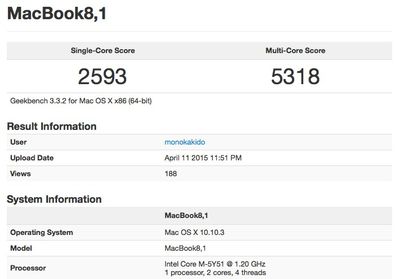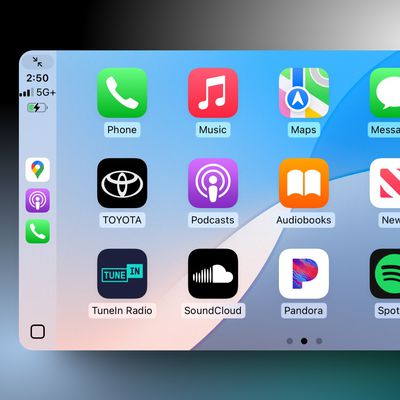Ahead of last Friday's launch of the new Retina MacBook, we saw several early benchmarks for the entry-level notebook running a 1.1 GHz Intel Core M processor, putting CPU performance for the new machine roughly on par with the 2011 MacBook Air according to Geekbench.
With the machines now available for purchase, we're starting to see Geekbench results for the mid-range 1.2 GHz processor, revealing a significant performance boost over the low-end chip for multi-core benchmarks, but less so for single-core testing.
It will take a little while for Geekbench results to firm up as the machines work through their early housekeeping tasks, but the best results we're seeing so far for the 1.2 GHz model are approaching 2600 on 64-bit single-core tests and over 5300 on multi-core tests. That performance compares to roughly 2400/4450 for the 1.1 GHz model, meaning that the mid-range model seems to be showing performance improvements at least in line with the 9 percent increase in CPU frequency. Multi-core performance in particular seems to be seeing a nice bump with the faster chip.

These scores for the 1.2 GHz Retina MacBook are roughly in the same range as the low-end models of the previous-generation Early 2014 MacBook Air, despite the much lower power consumption that has enabled Apple to build an ultra-thin fanless design.
In addition to the 1.1 GHz and 1.2 GHz chip options, Apple is also offering a 1.3 GHz processor as a build-to-order option. We have, however, yet to see any Geekbench results for these chips, and shipping estimates for machines with these chips were at 3-4 weeks when Apple began taking orders on Friday, suggesting it may yet be some time before we see data on their performance.
Apple is taking advantage of Intel's latest "Core M" Broadwell chips for the new Retina MacBook. The chips offer extremely low power usage, but Apple is slightly overclocking these chips for higher performance. The low-end MacBook uses a 5Y31 chip that runs by default at 900 MHz but which supports overclocking to 1.1 GHz at the cost of bumping power consumption from 4.5 watts to 6 watts, and Apple has elected to use the faster speeds to improve performance.
The mid-range MacBook uses the 5Y51 chip, which defaults to 1.1 GHz but which Apple has bumped by 100 MHz to run at 1.2 GHz. The high-end custom MacBook takes advantage of the 5Y71 chip that is designed to run at 1.2 GHz, and Apple has similarly bumped this one by 100 MHz to run at 1.3 GHz.
The Retina MacBook is in very short supply following its launch last Friday, with all stock and custom configurations currently listed as shipping in 4-6 weeks from Apple's online store. The company's retail stores also have yet to begin stocking the new machines, although some (mainly in the United States) do have models on display for customers to test out.





















